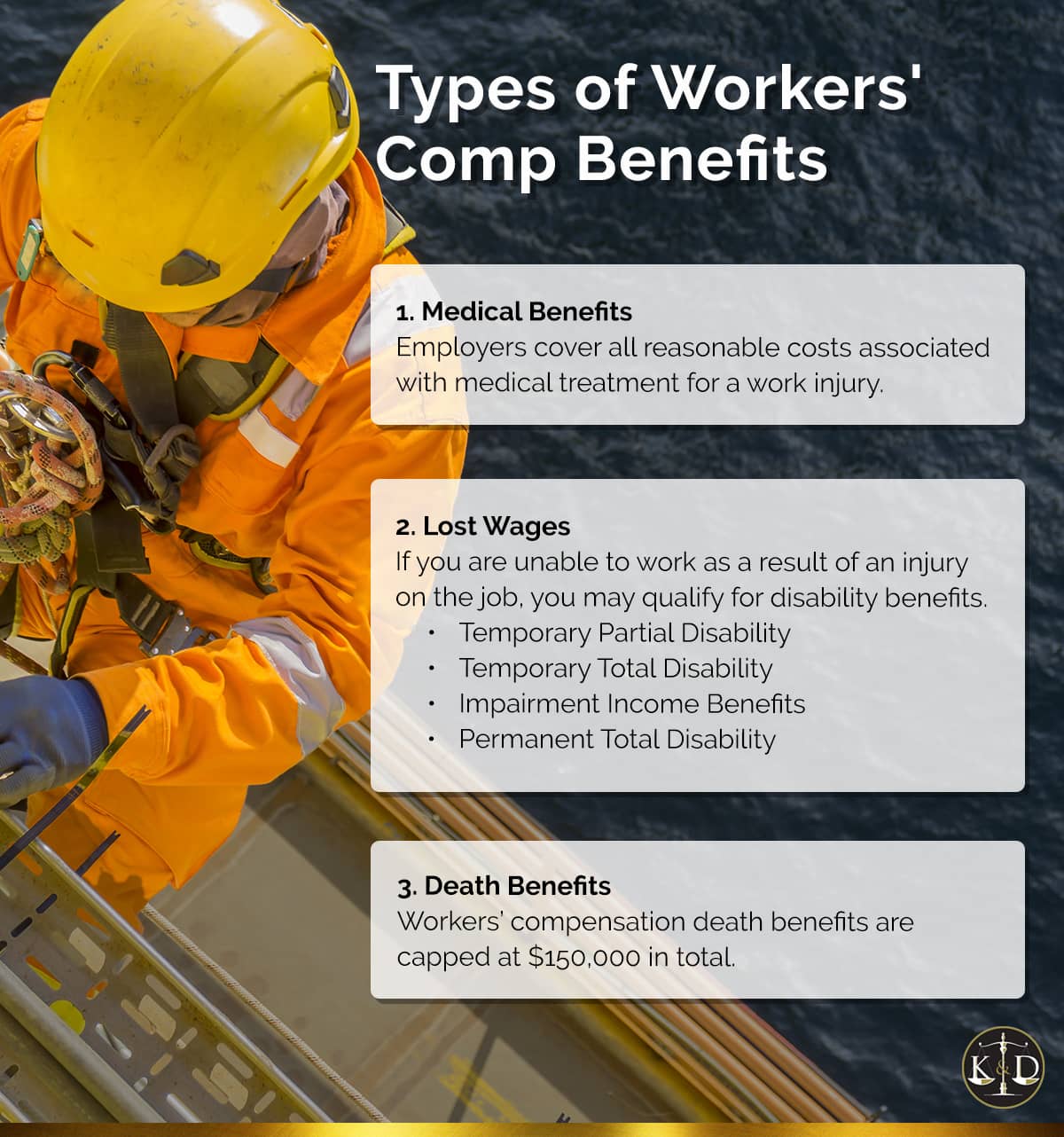Table of Contents
Being injured at work can have a major impact on multiple aspects of your life. The injury can limit or prevent you from doing your job, making it difficult to pay your bills. In addition, physical pain and impairment from the injury can lead to a wide range of personal and professional challenges.
Workers’ compensation is an insurance program that covers certain expenses incurred by employees after a work-related injury. Although workers’ comp operates on a no-fault basis (i.e., you do not have to prove that your employer was negligent to qualify for benefits), getting the benefits you deserve is not always easy.
If you have been hurt on the job or your loved one was killed in a workplace accident, Kogan & DiSalvo can help. Contact our workers’ compensation attorneys today, or by calling (561) 375-9500 today for your free consultation. Our attorneys serve clients throughout Florida.

Most employers in Florida are required to carry workers’ compensation insurance. This includes:
Some workers, such as domestic servants, are not considered employees and are therefore not entitled to workers’ comp benefits. Others – such as railroad workers, maritime workers, and more – are covered by federal workers’ compensation programs and are not entitled to benefits from the state.
Employee classification can be confusing for workers who get injured on the job. It is especially challenging if your employer wrongly classifies you as an independent contractor. Workers’ compensation does not cover independent contractors, which means your claim after a work injury would be denied.
Workers’ comp attorneys at Kogan & DiSalvo can examine the terms and nature of your employment. In the event of misclassification, our Florida workers’ compensation lawyers can dispute the denial of your workers’ compensation claim.
Florida’s workers’ compensation landscape is set to experience significant changes in 2025. A proposed 1% reduction in workers’ compensation insurance rates has been recommended by the National Council on Compensation Insurance (NCCI) and the Florida Chamber of Commerce. If approved by the Office of Insurance Regulation (OIR), this decrease will take effect on January 1, 2025, contributing to a remarkable 78% cumulative reduction since 2003. This decline reflects enhanced workplace safety measures and technological advancements that have minimized injuries and helped employees return to work more efficiently.
However, employers should be aware that the anticipated savings will be partially offset by increased physician reimbursement rates outlined in SB 362. The updated law raises medical reimbursement for doctors to 175% of Medicare rates, while surgeons could receive up to 210%. Additionally, expert witness fees will increase from $200 to $300 per hour, ensuring fair compensation for professionals providing crucial testimony in workers’ comp cases.
As Florida businesses prepare for these changes, they can expect a balance of lower insurance costs and improved medical service availability.
As these changes take effect, Florida businesses can look forward to reduced insurance costs alongside improved access to medical services. At Kogan & DiSalvo, we are always informed and we also want to keep our clients informed about all of the upcoming Florida workers’ compensation laws and regulations. This way, we ensure our clients receive the best possible outcomes. Whether you are an injured worker seeking fair compensation or a business navigating complex insurance regulations, our experienced team is ready to advocate for your rights and secure the solutions you deserve.
Any type of work-related injury or occupational illness is covered under workers’ comp. Some of the most common injuries and complaints for which employees file workers’ compensation claims include:
Some injuries occur as a result of accidents in the workplace. Others, however, may only become apparent over time.
Your health is precious. You should see a doctor as soon as possible if you have been injured on the job or you suspect that you have fallen ill as a result of your employment.
As with any insurance claim, there are a number of steps you need to take for your injury to be covered by workers’ comp. The process of filing for workers’ compensation includes:
Getting proper diagnosis and treatment for your injuries is the first priority. If you are seriously injured, you should go to the nearest hospital or emergency room.
Your employer or your employer’s workers’ compensation insurance carrier will designate the physician you need to see for subsequent treatment of your injuries. It is crucial to keep all doctor’s appointments, physical therapy sessions, and other scheduled care. Failure to do so can result in termination of your workers’ compensation benefits.
Workers have 30 days to notify an employer of a workplace injury or accident. If you do not report the injury within this time limit, you will almost certainly be denied benefits.
Once you report the work injury, your employer must file a claim with its workers’ compensation insurer within 7 days. The carrier then has 14 days to report the claim to the Florida Division of Workers’ Compensation.
If your employer fails to report your injury to the insurer or refuses to do so, you may need to file a claim with the insurance company directly. Generally, it is in your best interest to speak to a workers comp lawyer before trying to handle the claim on your own.
After receiving notice of a workplace injury, workers’ comp insurers are required to send a brochure outlining the employee’s rights and responsibilities under workers’ compensation. You should receive this brochure within 3 days of when the claim is filed.
Understanding your rights and obligations, the benefits you may be entitled to, and the procedures involved is of the utmost importance. Read the brochure closely to make sure you know what is covered by workers’ compensation, the terms of eligibility, and other key details.
Although the brochure is supposed to be written in clear and understandable language, it is natural to have questions and concerns about workers’ comp. With your benefits on the line, it is in your best interest to consult a workers’ compensation attorney as soon as possible.
Kogan & DiSalvo can help. We understand the enormous difference workers’ comp can make in the lives of injured workers, and we will do everything possible to protect your rights and ensure you receive the benefits you deserve.

Two of the biggest challenges facing workers who are hurt on the job are (1) medical bills and (2) loss of income. Workers’ compensation benefits help to remedy these losses, as well as those faced by families when a worker is killed on the job.
Depending on the circumstances of your work injury, you may be entitled to the following benefits:
Employers cover all reasonable costs associated with medical treatment for a work injury. This includes:
Workers’ compensation also reimburses you for travel to and from appointments with authorized physicians and pharmacies.
If you are unable to work as a result of an injury on the job, you may qualify for disability benefits. These benefits become payable after the eighth day of disability.
Several types of disability benefits are available to injured workers:
Disability benefits are subject to change, with workers often getting caught off-guard by a reduction or termination of their benefits. The Florida workers’ compensation attorneys at Kogan & DiSalvo can determine what benefits you may qualify for and challenge any adverse decisions.
Workers’ compensation death benefits are capped at $150,000 in total for the following:
Dependent spouses, children, parents, siblings, and grandchildren may be entitled to death benefits payments if a worker is killed on the job. The amount of compensation payable to each party will depend on the number of eligible dependents and their relation to the deceased worker.
Your employer and/or its insurance company may deny a workers’ compensation claim for a number of reasons. Some of the most common arguments employers and insurers use to justify denials include:
If your workers’ comp claim is denied, we strongly advise you to contact Kogan & DiSalvo as soon as possible. Our workers’ compensation attorneys will assess your case and advise you of your options for disputing the decision.
The first step is trying to negotiate a favorable resolution of your workers’ compensation claim. Our workers’ compensation lawyers are skilled and experienced negotiators, and we may be able to secure payment of benefits without having to file a formal appeal.
If negotiations are unsuccessful, the next step is to file a petition for benefits with the Office of the Judges of Compensation Claims. Petitions must contain detailed information concerning:
Failure to provide all necessary information in the petition for benefits may result in dismissal of your Florida workers compensation benefits claim. It is in your best interest to consult a knowledgeable workers’ compensation attorney who can complete the petition on your behalf.
If the insurance carrier continues to dispute payment of your workers’ compensation benefits, your claim will proceed to mediation. The mediation conference represents another opportunity to settle your workers’ comp case without going to court. If mediation is unsuccessful, representatives for both parties will argue the case before a judge; the judge will make the final ruling on your workers’ comp benefits.
The workers’ comp system is designed to be the sole legal remedy for employees who suffer injuries when they are on the job. In the vast majority of cases, workers are barred from suing their employers. Although this spares workers the burden of having to prove that their employer’s negligence caused the workplace accident, it also limits their recovery to the benefits available through workers’ comp.
Depending on the circumstances of your work injury, however, workers’ compensation might not be your only option. You may have one or more additional claims if a negligent third party contributed to the accident.
Potential examples of liable parties in a work injury lawsuit separate from workers’ comp include:
Oftentimes workers are unaware of their right to file claims against negligent third parties. Kogan & DiSalvo will fully investigate the workplace accident to determine who is at fault. We can assist you with your workers’ compensation claim, as well as take action against any parties that harmed you through negligence.

Insurance companies often don’t fight fair. Even in a no-fault system like workers’ compensation, claims are often unjustly denied and workers may not get the full benefits they deserve.
Work injury claims are complex. The Florida workers’ compensation lawyers at Kogan & DiSalvo have the experience to help you navigate the workers’ compensation system and identify additional options for pursuing damages. We strive to stop the insurance companies from taking advantage of you and maximizing your benefits and other compensation.
Our workers’ compensation attorneys serve clients throughout Florida from the following offices:
At Kogan & DiSalvo, our Florida workers’ compensation lawyer knows that a legal matter is more than just a case. It’s your life, and our team will take the time to help you navigate each aspect of the unique challenges involved in recovering from a workplace injury.
To discuss your workers compensation case with a knowledgeable workers’ comp attorney, please call (561) 375-9500 today. Your initial consultation is free, and you don’t pay anything unless we achieve a favorable outcome.
If you are injured and unable to come to us,
our attorney will come to you - there is no charge for us to do so.